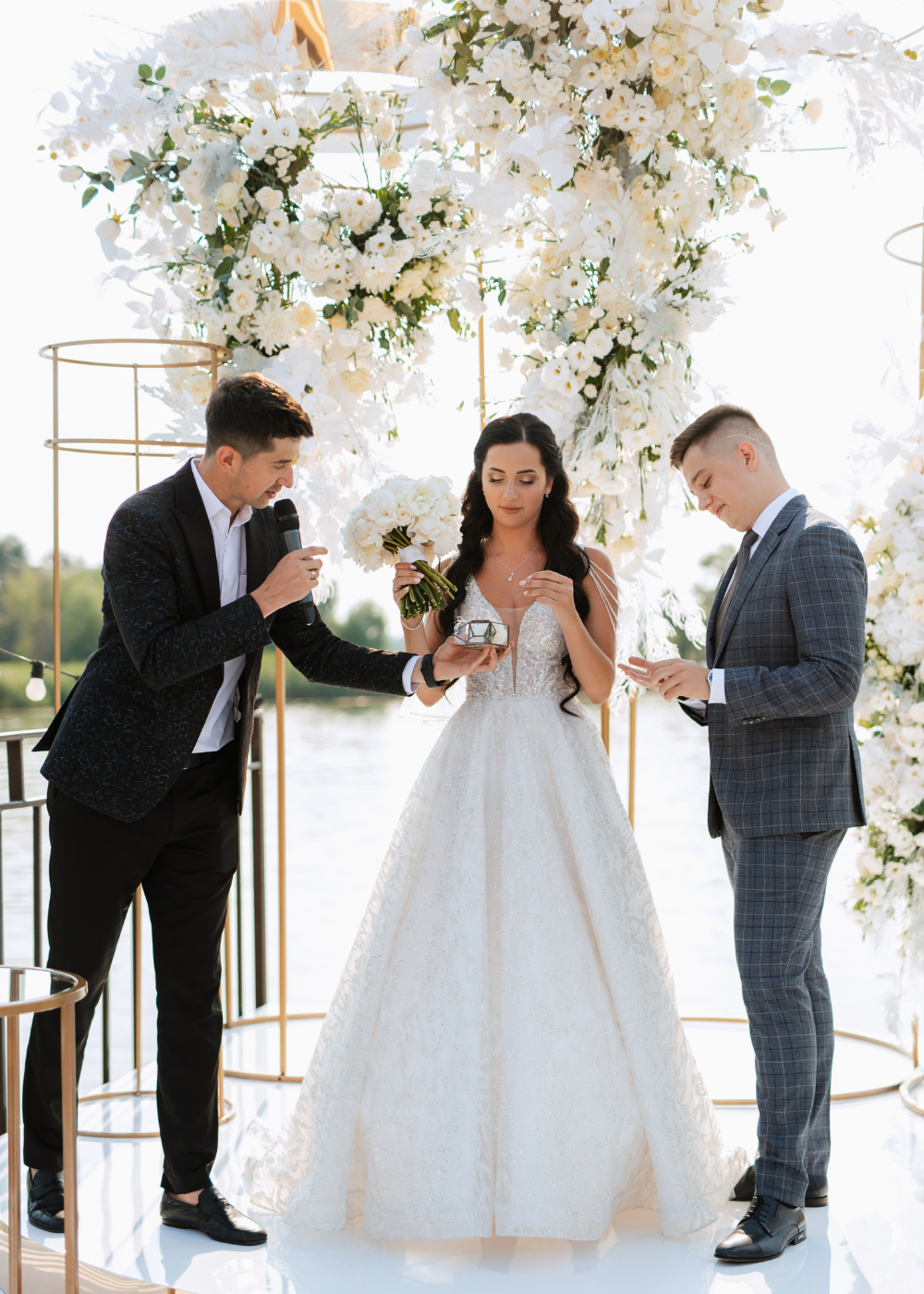Planning a wedding comes with many decisions, from choosing flowers to finalizing the guest list. But some wonder — can parents legally serve as wedding witnesses?
This guide covers everything you need to know.
Let’s dive into this complete guide on having parents as your wedding witnesses.
Read and learn the legal requirements, get etiquette advice, and see unique alternatives.
Can Parents Legally Serve as wedding Witnesses?

Most states allow parents to serve as legal wedding witnesses. They can sign marriage certificates and other official paperwork. Some couples choose this option as a way to honor their parents on the wedding day.
Age Requirements for Wedding Witnesses
When selecting your witnesses, age is an important factor to consider. Legal requirements vary by state, but generally witnesses must meet minimum age criteria.
In most states, wedding witnesses must be at least 18 years old. Some states allow younger witnesses, but have an age minimum such as 14, 16, or 17 years old. The reason for age requirements relates to legal competency. Witnesses must be able to understand and validate the marriage contract.
Keep local laws in mind when asking parents or other loved ones to serve as witnesses. If your heart is set on a younger sibling or friend, be sure to verify their eligibility based on age. The last thing you want is to be surprised on your wedding day and have to swap out an underage witness.
With a little planning and research, you can ensure your witnesses meet all legal age requirements. That way you can have your dream team standing by your side as you say “I do!”
Other Eligibility Requirements for Wedding Witnesses
In addition to age, there are other requirements to keep in mind when selecting your wedding witnesses. For example, in most states, witnesses must have legal mental capacity. They need to fully understand the marriage proceedings and be able to verify the legality of the marriage contract.
Residency status is another consideration. Some states require witnesses to be U.S. citizens or legal residents. Make sure to verify residency requirements if asking friends or relatives from out of the country.
The witness’s relationship to either the bride or groom can also play a role. Certain states prohibit first-degree relatives, such as parents, from serving as witnesses. Others don’t allow witnesses who stand to benefit financially from the marriage. Do your homework to avoid any eligibility issues.
While age is the most common requirement, don’t overlook other witness criteria. Confirm all legal qualifications to ensure your witnesses help make your wedding day official. With the right witnesses by your side, you’ll be one step closer to living happily ever after!
The Role and Responsibilities of Wedding Witnesses

Wedding witnesses serve an important legal function. They are required to observe the exchange of marriage vows and sign the marriage certificate to help validate the union. This verifies that the marriage ceremony took place and was properly officiated.
The witnesses’ signatures act as proof that the bride and groom did indeed say “I do.” Their names will be documented right on the marriage license along with the newlyweds’ and officiant’s. Witnesses must be present for the entire ceremony to appropriately fulfill their duty.
In addition to signing paperwork, witnesses may also be asked to participate in certain wedding traditions. This includes holding onto the rings until the ring exchange or joining the recessional at the end. Witnesses in close relationship with the couple often give readings or offer remarks during the ceremony as well.
When selecting your witnesses, make sure they understand the legal and traditional obligations. Reliable witnesses are key for ensuring all marriage license requirements are met. With their signatures and support, you’ll have the documentation and memories to cherish your special day for years to come.
Having Both Parents Serve Together as Witnesses
Some couples want to honor their parents by having them serve as their legal witnesses. This is a special way to include them in the ceremony. However, most states actually prohibit both parents from signing together.
The law requires witnesses be unrelated and impartial. Parents are considered to have a conflict of interest in verifying the legitimacy of their own child’s marriage. For this reason, couples can choose one parent along with another witness. But both mother and father cannot legally co-sign.
If you want your parents involved, there are many other meaningful roles for them. Consider having your mom do a reading or your dad make a toast at the reception. Another option is including both parents in the processional or recessional. You can also display photos of your family during the ceremony.
While parents cannot be paired as witnesses, each one can participate separately in this capacity. Take into account your state’s regulations when selecting your ideal witnesses. With creativity and care, you can still honor your parents in personal ways on your wedding day.
Choosing One Parent Over the Other as a Witness
Deciding which parent to have as your witness can feel like an impossible choice. You may feel caught between honoring both mother and father equally. First, remember that this decision does not reflect the depth of your love and appreciation for each parent. Your wedding day involves many chances to recognize their importance in your life.
When selecting one parent over the other as your legal witness, consider practical factors. Which parent’s schedule and health will allow them to fully participate? If one is elderly or ill, the other may be a safer option to avoid last-minute scrambles. Proximity on the wedding day is key too. A local parent won’t have to rush to make it on time.
Another approach is letting your parent decide if they feel comfortable signing. Explain the legal responsibility involved and see if they have a preference. Make it clear there is no pressure either way. With open communication and understanding, you can move forward with sensitivity.
Most importantly, look at your witness duty as just one small piece of your wedding day. Find personalized ways to share this milestone with both parents, even if their roles look a little different.
Asking Step-Parents to Serve as Witnesses

For those with step-parents, choosing witnesses can become even more complex. You may feel caught between honoring your biological parents and also recognizing those who raised you. While it’s thoughtful to include step-parents, proceed with care.
First, gauge if your biological parent would feel hurt by a step-parent signing as a witness instead of them. Make your decision sensitive to existing family dynamics. If tensions exist, choosing your step-parent could cause unnecessary pain.
That said, if you have a close bond with a step-parent who has been a major part of your life, they may be the right choice for you. Share your thought process kindly with your biological parent ahead of time. Emphasize this doesn’t diminish your relationship.
You can also find creative ways to include both step-parents and biological parents. Have your biological parent do a reading while your step-parent signs as a witness. Or have both sets of parents involved in your ceremony in other meaningful ways.
When navigating complex family structures, communicate with love and honesty. Make decisions thoughtfully, not impulsively. With care and effort, you can find solutions to honor all your parents.
When Parents Can’t or Shouldn’t Serve as Witnesses
Sometimes it’s best not to have parents as witnesses. If you have a strained relationship, forcing their participation could ruin the joy of your big day. Or if they live far away, it may be impractical. Parents with health issues may struggle with the demands of the role.
In these cases, choose witnesses who truly support your relationship. Siblings, close friends, or trusted mentors make wonderful options. Those who have walked with you through dating struggles can testify to your commitment.
If parents feel hurt about being excluded, have an honest discussion. Explain your thinking kindly, emphasizing your love for them. Consider including them in other ceremonial ways, like readings or blessings.
While parents often expect to serve as witnesses, your wedding is ultimately about you and your partner. Surround yourselves with people who build you up and wish you well. With open communication and creativity, you can still make parents feel valued, even if they don’t sign as witnesses. The joy of gaining a spouse eclipses any tradition.
Alternative Witness Options if Parents Can’t Serve

If parents can’t be your witnesses, you have many other meaningful options. Close siblings, like a sister or brother, make excellent candidates. They’ve journeyed with you throughout life and can speak to your character and relationship. Or choose a best friend who has supported you both as a couple—someone who truly believes in your love.
Mentors also make wonderful witnesses. A pastor who provided premarital counseling or a small group leader who poured wisdom into your relationship are ideal. Teachers or coaches who invested in you individually and as a couple can fill the role meaningfully.
If children are involved, consider making them witnesses if old enough. Including kids cements their place in your new family. Alternatively, you could have children sign as “witnesses in spirit” on a separate ceremonial document.
With creativity and open communication, you can ensure your witnesses accurately represent your relationship. Don’t let the absence of parents dampen your joy. This season is about you joining your life to another. Surround yourselves with people who will champion that purpose.
How to Honor Parents if They Aren’t Official Witnesses
Just because your parents aren’t official witnesses doesn’t mean they can’t be involved in special ways.
Have them do a reading during the ceremony that highlights marriage or parent-child relationships. This allows them to impart wisdom and blessings on your union. Or invite them up for a unity ritual like lighting a candle or tree planting to represent joining families.
If your officiant allows, you could have parents sign the marriage license as unofficial witnesses. This symbolic gesture still makes them feel part of the legal process.
You can also recognize parents during reception toasts and dedicate a special dance to honor them. Creating a customized parent gift like a framed wedding photo or family tree helps them feel remembered.
Your wedding day is about gathering loved ones to witness you start a new chapter. With creativity and care, you can make sure your parents feel special, even if they aren’t official witnesses.
Frequently Asked Questions (FAQs)
Can my dog be a witness at my wedding in California?
No, pets cannot serve as legal witnesses at weddings in California. Witnesses must be adult humans who can sign the marriage license.
How many witnesses do you need to get married in TN?
You need at least one witness who is 18 years of age or older to get married in Tennessee. There is no limit on the maximum number of witnesses.
Do you need witnesses to get married in Georgia?
Yes, you need at least two witnesses who are 18 years of age or older to get married in Georgia.
Do you need witnesses to get married in PA?
Yes, you need two witnesses who are 18 years of age or older to get married in Pennsylvania.
Conclusion
Most states require at least two adult human witnesses to sign the marriage license in order for it to be legally valid. Witnesses are an important part of making a marriage official. Parents and other close family members can serve as witnesses at weddings, as long as they meet the age requirements. The key points are that witnesses must be adults, the number of required witnesses varies by state, and pets cannot legally serve as witnesses.

